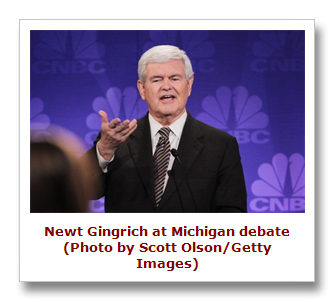The case for Newt Gingrich
A few months ago former Speaker of the House Newt Gingrich’s GOP presidential bid appeared terminal; campaign staff was fleeing and fund-raising was virtually non-existent. Now after a slew of debates many are giving Newt a second look and the polls are showing him far from dead.
During Newt’s tenure as Speaker of the House he was a perpetual whipping-boy for the far left. Newt’s staunch and in some minds stubborn determination to preserve the tenants of the “Contract with America,” made him the primary target of the liberal press and the Democratic Party. Unfortunately for Newt, his own behavior emboldened his opponents and armed them sufficiently to drive him from office.
As a co-author of the 1994 Contract with America, Gingrich was in the forefront of the Republican Party’s dramatic success in that year’s Congressional elections and subsequently was elected Speaker of the House. In 1995, Time magazine named him “Man of the Year” for his role in leading the Republican Revolution in the House, ending 40 years of the Democratic Party being in the majority. During his tenure as Speaker, he represented the public face of the Republican opposition to President Bill Clinton. Under his Speakership, Congress passed and Clinton signed the 1996 reform of welfare, a capital gains tax cut and the first balanced budget since 1969.
During Newt’s term as Speaker, eighty-four ethics charges were filed against him; eighty-three of them were dropped. The remaining charge concerned a 20-hour college course called “Renewing American Civilization” that Gingrich had taught through the Kennesaw State College Foundation, a tax-deductible organization. Allegations of tax improprieties led to two counts “of failure to seek legal advice” and one count of “providing the committee with information which he knew or should have known was inaccurate” concerning the use of a tax exempt college course for political purposes. In an effort to avoid a full hearing, Gingrich and the House Ethics Subcommittee negotiated a sanctions agreement. On January 21, 1997, the House voted 395 to 28 to reprimand Gingrich, including a $300,000 “cost assessment” to recoup money spent on the investigation. In 1999, the IRS cleared the organizations connected with the courses, but by then it was too late for Newt.
Republicans lost five seats in the House in the 1998 midterm elections—the worst performance in 64 years for a party that didn’t hold the presidency. Polls showed that Gingrich and the Republican Party’s attempt to remove President Clinton from office were widely unpopular among Americans. Gingrich suffered much of the blame for the election loss. Facing another rebellion in the Republican caucus, he announced on November 6, 1998 that he would not only stand down as Speaker, but would leave the House as well. Commenting on his departure, Gingrich said, “I’m willing to lead but I’m not willing to preside over people who are cannibals. My only fear would be that if I tried to stay, it would just overshadow whoever my successor is.”
Prior to and during his time in Congress Gingrich’s personal life had been a train-wreck; married 3 times, the last being the product of an affair with a House of Representatives staffer Callista Bisek, however this time it apparently stuck. Newt and Callista have been happily married for 11 years and anyone who knows Newt would say that he is today a much different person than he was during his days in Congress; but is he presidential material?
One of the reasons for Newt rising from the ashes of a DOA presidential bid can be put simply: from an intellectual point of view, everyone else on the debate stage seems in a different league. Newt isn’t only clearly the best-spoken and learned on matters of public and foreign policy, he is also a true “idea man.” While his opponents in the debate seem focused on not stubbing their toes, Newt hasn’t held back, issuing solutions and ideas that have caused the Republican primary electorate to see Newt beyond his personal foibles. Many Republican voters are beginning to focus on who will stand on the stage beside Barack Obama in the presidential debates and that image is elevating Newt to the top tier of Republican hopefuls.
There is no doubt that Newt has made some poor personal choices in his life and he has clearly admitted he sees his past in a much different light. Will that be a bridge too far for some Republicans? Perhaps. Ultimately the Republican electorate will decide whether Newt’s past stumbles outweigh the goal of unseating Obama and changing the trajectory of the country. In a time where the White House has the appearance of no clue whatsoever, Newt’s ability to conceive solutions and chart a positive course for the country, as well as his broad experience and intellectual stature would seem to make him the slam-dunk choice; but in politics, nothing is ever a slam-dunk.
Republicans need to decide on their priorities; there are likely a number of candidates that could send Obama back to Chicago, but unless they put someone in place that can truly turn the country around it will be a short stay at 1600 Pennsylvania Avenue. After nearly 3 years of aimlessness, the Republicans need to think beyond the flavor of the week and decide who is truly the best choice for the nation. Now that Republican voters are taking a serious second look at Gingrich, it would appear they are beginning to think beyond who they don’t want in the White House to who they want running the country.

